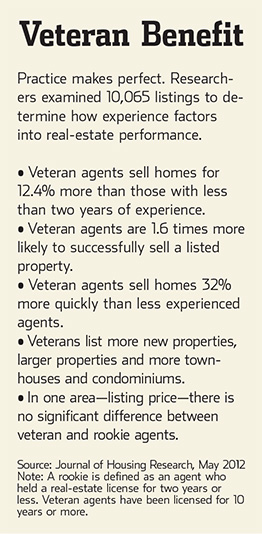Can you put a price on experience? In real estate, you can. It is about $25,000 for the average house.
Veteran agents sell homes for an average of 12% more than their less experienced counterparts, says Bennie Waller, professor of finance and real estate at Longwood University in Farmville, Va. Veteran agents also tend to list more new properties, more townhouses and condominiums and larger properties.
Associated PressTwo-thirds of properties listed by veteran agents sold, while only half of properties listed by rookies did.
“The more experience you have, the more likely you are to sell the properties that you list, the more likely you are to sell it at a higher price and the less time it stays on the market,” Prof. Waller says.
Prof. Waller, along with Ali Jubran, a student at Longwood University at the time, examined 10,065 real-estate listings in a mid-Atlantic multiple-listing service from March 1999 to July 2009. They divided the listings into three groups—ones listed by agents who have been licensed for two years or less (called rookies), agents who have been licensed for two to 10 years and agents who have been licensed for 10 years or more (called veterans). They controlled for property characteristics such as size and location to isolate the “experience variable,” and then compared the results for rookies and veterans. The study was published in the Journal of Housing Research in May 2012.
Prof. Waller became interested in quantifying experience when he noticed an increasing number of agents who chose not to renew their licenses after two years. Real estate has “very, very, very low barriers to entry,” he says. But brokers then face a steep learning curve and many struggle to reach a level of expertise that is profitable, he adds.
Two-thirds of properties listed by veteran agents sold, while only half of properties listed by rookies did. That may be because rookie agents have to be more flexible in picking up listings, even if the chances of selling are low.
“If a house is priced ridiculously, they might say, ‘Fine, I’ll take the listing,’ ” Prof. Waller says.
Generally, experienced agents have greater knowledge of the neighborhoods and a larger network of buyers and sellers, as well as relationships with home inspectors, appraisers and mortgage brokers.
For some, confidence comes with time. James Stroupe, a real-estate agent at Realogics Sotheby’s International Realty in Seattle, says he used to take listings priced above-market, but now, with nearly 20 years of experience under his belt, he isn’t afraid to suggest an alternative price.

And then there are the lessons learned. Michael Rankin, principal and managing partner of TTR Sotheby’s International Realty in Washington, D.C., began selling real estate right out of college, so he faced the twin pitfalls of inexperience and youth.
“I would meet people and say I’m a real-estate agent. They would joke and say, ‘I’ve got children older than you. Are you sure you’re a real-estate agent?’ ” he says.
Mr. Rankin says he didn’t get referrals until his third year in the business. Referrals now make up about 70% of his sales. His listings stock also has changed dramatically. In his 20s, his average sale price was about $300,000 to $400,000. Now, it is more than $2 million.
Experience taught him how to deal with consumer behavior. “Residential real estate is really an emotional transaction. I don’t think I was prepared for any of it. It’s about understanding and knowing people. That, to me, is what an experienced broker brings to the table,” he says.
When Pamela J. Hagan first began practicing real estate about 30 years ago, she had a listing that just wouldn’t sell. After zero offers in eight months, she asked a more experienced agent to help. “We tweaked the price and staged it properly, removed clutter and everything. I just didn’t think of that when I was new,” says Ms. Hagan, of Century 21 Beggins Enterprises in Longboat Key, Fla. “After we got it all set up and dropped the price, we sold it within 30 days.”

